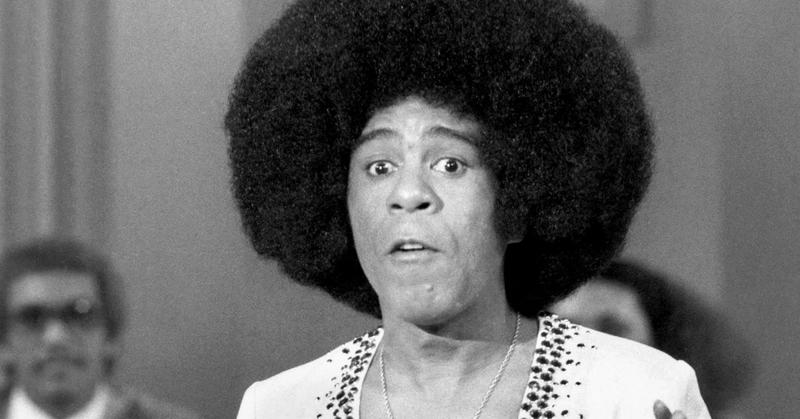The Richard Pryor Show, 1977: Four Episodes, Goodbye
By | September 7, 2020

The Richard Pryor Show on NBC is as unlikely as it sounds -- how could a network give the most outrageous standup comedian in the business his own comedy show in prime time? But that's just what happened in 1977. The program was brilliant, risky, uncompromising, and too good to last. Just four episodes in, The Richard Pryor Show came to a screeching halt. But its brief run left a lasting influence on a generation of comedians, and its fearless approach to taboo subjects is seen the most successful comedy shows in the 21st century.

In the '70s and '80s, no comedian owned the title of "Comic's comic" more than Richard Pryor. The foul-mouthed, in-your-face Pryor trampled the clean-cut Bill Cosby style with comedy albums titled That Ni**er's Crazy and Bicentennial Ni**er. Those two comedy albums went gold and won Grammys in back to back years. Despite an insanely difficult childhood where he was raised by his grandmother in a brothel, Pryor found success creating a comedic style that was never seen before or since. Despite his expletive laden, can't-believe-what-he-just-said style, NBC decided they should give the wildly successful comedian his own network show. In '77 a short but legendary four-episode run of The Richard Pryor Show shocked the world.
An Inauspicious Opening

If NBC needed any hints as to how Pryor would run his own television show, they only needed to see the opening that Pryor had planned. The introduction that never aired included a buck naked Richard Pryor with his genitalia removed like a Ken doll. Who knows whether the legendarily transparent Pryor was trying to tell audiences something about the behind the scenes negotiations over content.
"Look at me, I'm standing here naked. I've given up absolutely nothing," Pryor said, answering people's concerns that network television would compromise his artistic genius. It's worth noting that Pryor chose "For The Love Of Money" as the theme song. Perhaps after seeing his preferred opening, NBC began questioning their decision to slot the show smack dab in the middle of "family hour" on Tuesdays.
A Rock Star Cast

Thanks to Pryor's larger than life status, especially in comedy circles, the show attracted a hall of fame lineup of funny people. Robin Williams, Marsha Warfield, Sandra Bernhard, John Witherspoon, Paul Mooney, John Belushi, Maya Angelou, Edie McClurg, and Alan Thicke as a writer all got on board. However, they all quaked in the presence of Pryor, "I totally panicked," said Warfield about working with Pryor. "We were all just intimidated. He was a legend becoming an icon. He was already a superstar, but he had not yet, at that time, reached the heights that he was to reach. We were just little children sitting at the master's feet."
The Most Influential Comedian, Maybe Ever

Finding a few of the old Richard Pryor Show sketches on youtube isn't hard. What is difficult to believe is how forward-thinking and influential those sketches became. Pryor essentially created Chappelle's Show and Key & Peele 35 years before they came about. Chappelle himself considers Pryor one of his heroes, "You know those, like, evolution charts of man? He was the dude walking upright. Richard was the highest evolution of comedy."
Ahead Of His Time

One of the most famous sketches from the show portrayed Pryor as the President answering questions from the media. After taking questions on the Middle East and unemployment, Pryor takes a question from "Brother Bell" of Ebony magazine. "Brother, about blacks in the labor force," Bell says, "I wanna know what you gonna do about having more black brothers as quarterbacks in the National Football Honky League."
As only Pryor could, he answered, "I plan not only to have lots of black quarterbacks, but we gon' have black coaches and black owners of teams. As long as it's gon' be football, it's gon' be some black in it somewhere!" It's been decades since The Richard Pryor Show, and we are still seriously talking about things that Pryor was lampooning over three decades ago. According to Warfield, Pryor's comedy influenced an entire generation, "That was the comedy that Richard did," Warfield said. "That was the kind of comedy I was learning how to do. You do stuff you care about and you bring issues to the forefront. And punch up at sacred cows."
An Ignominious End To The Amazing Richard Pryor Show

When Pryor found out the producers were replacing his naked opening, lampooning his fight with censors, he quit. Ultimately, they talked him back into the fold but that fight set the tone. Actor Tim Reid remembers the reaction from NBC producers, "You'd think we were building nuclear fusion equipment," said Reid, laughing. "They were so afraid of us because they knew what we were doing was so counter to the system of TV."
Some sketches that turned the squares in bunches depicted a rock star killing all his white fans with a machine gun and a lesbian describing her first sexual experience in a park. However, the show also possessed a soul. In one episode, Maya Angelou delivered an original monologue, detailing the pain black women face from the traumas initiated by black men.
In another, Pryor goes to buy a gun and each weapon tells its history from shooting a kid to fighting in war. NBC producers pulled their hair out over the show's four episode run but the people who found it and the New York Times approved, "If there are any problems about content, the time slot should go but Mr. Pryor should definitely stay. Television can use his originality." Pryor called it quits after four episodes, unable to deal with the censorship or his growing drug problems.
